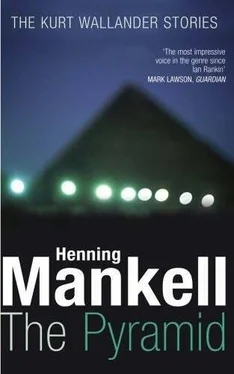Tyra Olofsson told him about the local animal protection association that she and a few other like-minded individuals had started in the 1960s. They had always worked locally and the impetus for the association was the increasing problem of abandoned summer cats. The association had always been small, with few members. One day in the early seventies, Emilia Eberhardsson had read about their work in the Ystad Allehanda and got in touch. She had given them money every month and participated in meetings and other events.
'But I don't think she really liked animals,' Tyra said unexpectedly. 'I think she did it so she would be thought of as a good person.'
'That doesn't sound like such a nice description.'
The woman on the other side of the table looked cheekily at him.
'I thought policemen wanted to know the truth,' she said. 'Or am I wrong?'
Wallander changed the subject and asked about money.
'She donated a thousand kronor a month. For us that was a lot.'
'Did she give the impression of being rich?'
'She never dressed expensively. But I'm sure she had money.'
'You must have asked yourself where it came from. A sewing shop is hardly something one associates with a fortune.'
'Not one thousand kronor a month either,' she answered. 'I'm not particularly curious. Perhaps it's because I see so badly. But where the money came from or how well their shop did, I know nothing about.'
Wallander hesitated for a moment, and then he told her the truth.
'It has been reported in the papers that the sisters burned to death,' he said, 'but it has not been reported that they were shot. They were already dead when the fire started.'
She sat up.
'Who could have wanted to shoot two old ladies? That's as likely as someone wanting to kill me.'
'That is exactly what we are trying to understand,' Wallander said. 'That's why I'm here. Did Emilia ever say anything about having enemies? Did she appear frightened?'
Tyra Olofsson did not have to reflect.
'She was always very sure of herself,' she said. 'She never said a word about her and her sister's life. And when they were away she never sent a postcard. Not once, even with all the wonderful postcards with animal motifs that you can get these days.'
Wallander raised his eyebrows.
'You mean they travelled a lot?'
'Two months out of every year. November and March. Sometimes in the summer.'
'Where did they go?'
'I heard it was Spain.'
'Who took care of their shop?'
'They always took turns. Perhaps they needed time apart.'
'Spain? What else do the rumours say? And where do these rumours come from?'
'I can't remember. I don't listen to rumours. Perhaps they went to Marbella. But I'm not sure.'
Wallander wondered if Tyra Olofsson was really as uninterested in rumours and gossip as she seemed. He had only one remaining question.
'Who do you think knew Emilia best?'
'I would think it was her sister.'
Wallander thanked her and walked back to the station. The wind was even stronger. He thought about what Tyra Olofsson had said. There had been no meanness in her voice. She had been very matter-of-fact. But her description of Emilia Eberhardsson had not been flattering.
When Wallander reached the station, Ebba told him that Rydberg had been looking for him. Wallander went straight to his office.
'The picture is becoming clearer,' Rydberg said. 'I think we should get the others and have a short meeting. I know they're around.'
'What's happened?'
Rydberg waved a bunch of papers.
'VPC,' he said. 'And there's a great deal of interest in these papers.'
It took Wallander a moment to remember that VPC stood for the Swedish securities register centre, which, among other things, recorded stock ownership.
'For my part I've managed to establish that at least one of the sisters was a genuinely unpleasant person,' Wallander said.
'Doesn't surprise me in the least,' Rydberg chuckled. 'The rich often are.'
'Rich?' Wallander asked.
But Rydberg did not answer until they were all assembled in the conference room. Then he explained himself in detail.
'According to the Swedish securities register centre, the Eberhardsson sisters had stocks and bonds totalling close to ten million kronor. How they managed to keep this from being subject to the wealth tax is a mystery. Nor do they appear to have paid income tax on their dividends. But I've alerted the tax authorities. It actually appears that Anna Eberhardsson was registered as a resident of Spain. But I'm not clear on the details of this yet. In any case, they had a large portfolio of investments both in Sweden and abroad. The Swedish securities register centre's ability to check international investments is of course minimal; this is not their job. But the sisters invested heavily in the British weapons and aviation industries. And in this they appear to have shown great skill and daring.'
Rydberg put down the documents.
'We can thus not exclude the possibility that what we see here is only the tip of the proverbial iceberg. Five million in a safe and ten million in stocks and bonds. This is what we have uncovered in the space of a few hours. What happens after we've been working for a week? Perhaps the amount will increase to one hundred million?'
Wallander reported on his meeting with Tyra Olofsson.
'The description of Anna isn't flattering either,' Svedberg said when Wallander had finished. 'I talked to the man who sold the sisters the house five years ago. That was when the market was getting soft. Until then they had always rented. Apparently it was Anna who negotiated. Emilia was never present. And the estate agent said Anna was the most difficult customer he ever had. Apparently she had managed to find out that his company happened to be in crisis at that time, with regard to both solidity and liquidity. He said that she had been completely ice-cold and more or less blackmailed him.'
Svedberg shook his head.
'This isn't exactly how I would have imagined two old ladies who sold buttons,' he said and the room fell silent.
Wallander was the one who broke the silence.
'In a way this has been our breakthrough,' he started. 'We still have no leads on who killed them. But we have a plausible motive. And it is the most common of all motives: money. In addition, we know that the women committed tax fraud and concealed great sums of money from the authorities. We know that they were rich. It won't surprise me if we turn up a house in Spain. And perhaps other assets, in other parts of the world.'
Wallander poured himself a glass of mineral water before continuing.
'Everything we know now can be summed up in two points. Two questions. Where did they get the money? And who knew that they were rich?'
Wallander was about to lift the glass to his lips when he saw Rydberg flinch, as if he had been given a shock.
Then his upper body slumped over the table.
As if he was dead.
Later, Wallander would remember that for a few seconds he had been entirely convinced that Rydberg had died. Everyone who was in the room when Rydberg collapsed thought the same thing: that Rydberg's heart had suddenly stopped. It was Svedberg who reacted first. He had been sitting next to Rydberg and could tell that his colleague was still alive. He grabbed the telephone and called for an ambulance. Wallander and Hansson lowered Rydberg onto the floor and unbuttoned his shirt. Wallander listened to his heart and heard it beating very quickly. Then the ambulance arrived and Wallander accompanied it on its short drive to the hospital. Rydberg received immediate treatment, and after less than half an hour Wallander had been informed that it was not likely to have been a heart attack. Rather, Rydberg had collapsed for some as yet unknown reason. He was conscious at this point but shook his head when Wallander wanted to talk to him. He was judged to be in stable condition and admitted to the hospital for observation. There was no longer any reason for Wallander to stay. A patrol car was waiting outside to drive him back to the station. His colleagues had remained in the conference room. Even Björk was present. Wallander could inform them that the situation was under control.
Читать дальше












